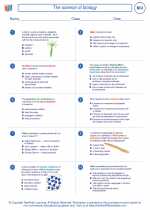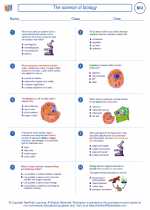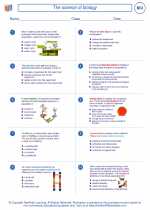Filtration in Biology
Definition: Filtration is a method used to separate solids from liquids or gases using a filter medium that allows the liquid or gas to pass through while retaining the solid particles.
Application in Biology: Filtration is widely used in biology for various purposes, including separation of biomolecules, microbial analysis, water purification, and cell culture.
Study Guide for Filtration
Key Concepts
- Filter Medium: The material through which the liquid or gas is passed to separate the solid particles.
- Particle Size: Understanding the size of the particles being filtered is important in selecting the appropriate filter medium.
- Applications: Familiarize yourself with the various applications of filtration in biological research and industry.
Process of Filtration
- Preparation: Ensure that the filter apparatus is clean and assembled correctly.
- Selection of Filter Medium: Choose the appropriate filter medium based on the size and nature of the particles to be separated.
- Filtration: Pour the mixture to be filtered into the filter apparatus and allow the liquid to pass through while retaining the solid particles.
- Washing: Sometimes, washing the retained particles with a suitable solvent or buffer may be necessary to further purify the sample.
Importance of Filtration in Biology
- Purification: Filtration helps in purifying biological samples for accurate analysis and experimentation.
- Separation: It enables the separation of different components of a biological mixture, facilitating further study and research.
- Quality Control: In industries such as pharmaceuticals, filtration is crucial for ensuring the purity and quality of biological products.
Conclusion: Filtration is a fundamental process in biology, with diverse applications in research, analysis, and industrial processes. Understanding the principles and applications of filtration is essential for conducting biological experiments and maintaining the quality of biological samples and products.
[Filtration] Related Worksheets and Study Guides:
.◂Biology Worksheets and Study Guides High School. The science of biology
Worksheet/Answer key The science of biology
The science of biology  Worksheet/Answer key
Worksheet/Answer key The science of biology
The science of biology  Worksheet/Answer key
Worksheet/Answer key The science of biology
The science of biology 

 Worksheet/Answer key
Worksheet/Answer key
 Worksheet/Answer key
Worksheet/Answer key

The resources above cover the following skills:
Nature of Science
The Practice of Science - A: Scientific inquiry is a multifaceted activity; The processes of science include the formulation of scientifically investigable questions, construction of investigations into those questions, the collection of appropriate data, the evaluation of the meaning of those data, and the communication of this evaluation. B: The processes of science frequently do not correspond to the traditional portrayal of ''the scientific method.'' C: Scientific argumentation is a necessary part of scientific inquiry and plays an important role in the generation and validation of scientific knowledge. D: Scientific knowledge is based on observation and inference; it is important to recognize that these are very different things. Not only does science require creativity in its methods and processes, but also in its questions and explanations.
Define a problem based on a specific body of knowledge, for example: biology, chemistry, physics, and earth/space science, and do the following:
Use tools to gather, analyze, and interpret data (this includes the use of measurement in metric and other systems, and also the generation and interpretation of graphical representations of data, including data tables and graphs)
Describe and explain what characterizes science and its methods.